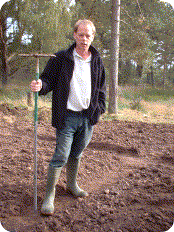The Notable Quotable Blether
by Patrick Vickery
Here are a few quotes that may be of interest to fellow gardeners. I certainly hope so.
Gardening, like any other pastime, has it's myths, mystiques and folklore's (many of which are a load of old nonsense of course), but knowing what's nonsense and what's good gardening sense takes time and skill to sort out.
 A hundred gardeners, gathered together to discuss the best method of constructing a compost heap, will produce a hundred different answers. It is this which makes gardening so exciting of course, for apart from a few simple rules of thumb there are no experts: each has an equally valid way of doing things if the end result is what they are seeking.
A hundred gardeners, gathered together to discuss the best method of constructing a compost heap, will produce a hundred different answers. It is this which makes gardening so exciting of course, for apart from a few simple rules of thumb there are no experts: each has an equally valid way of doing things if the end result is what they are seeking.
Now that's a particular favourite of mine. Why? Because I've had arguments with others in the past - extremely unproductive arguments they were too - about the best method of constructing a compost heap, and this in the days before I became aware that gardening was not about being an expert, but about doing what's best for you and your garden in the circumstances in which you find yourself.
It's worth having a recycling bin for second hand compost. There's no point in throwing it away when you can re-use it for generally enriching the soil in your flowerbeds, filling trenches, potting or anything else that you care to think of. And should the occasional misplaced seedling appear where it shouldn't, you simply pot it up and sell it!
You become the compost expert when you start your own compost heap, that's the first and most important rule to remember. Even imperfect compost will be of benefit. Trial and error and lots of experimentation is what it's all about.........The easiest compost heap, and one that's within the practical bounds of most gardeners, is a multi-layered one. You don't need large quantities of any single material, just small amounts of many.
As long as you follow a few simple rules, growing plants from seed is easy, even if you don't have a greenhouse or a polytunnel. In many ways it's easier. Seeds grown outside and in the natural elements mean that you'll encounter fewer troublesome pests than those grown indoors or undercover and so you'll have little or no need for pesticides.
An area set aside for wildlife is essential, no matter how small, and even a limited wildlife area within the garden to offer shelter, safety and food for beneficial insects that prey on the not so beneficial ones will be an invaluable asset. And - of course - if you create as natural an environment as possible, you'll have little or no need for chemicals or sprays.
The 'chemical' Gardener goes to war on a daily basis and perceives his garden akin to a 'battlezone', whereas the 'organic' Gardener tends to diffuse potential problems before they have the opportunity to escalate.
Pest Control is simply that of course - control - as opposed to chemical gardening which brings with it a variety of problems that can only make things worse in the long run.
By encouraging natural predators to take up residence in your garden they will help to keep any pests under control. Spray with chemicals, however, and you not only kill the pests but also the predators that feed on them, so when the pests return - as they surely will - you will no longer have sufficient quantities of natural predators to keep the numbers down.
The source of these quotes?
In Pursuit of Perennial Profit. The Pot Of Gold At The Bottom Of the Garden. (Capall Bann Publishers, UK. ISBN: 186163 1480).
The Author? Patrick Vickery
(Yes, that's me!)
Quotes excerpted from 'In Pursuit Of Perennial Profit': isbn 186 163 1480.
Capall Bann Publishers. Copyright 2001. All rights reserved. Reprinted by permission.
(Copy write 2002: Patrick Vickery)